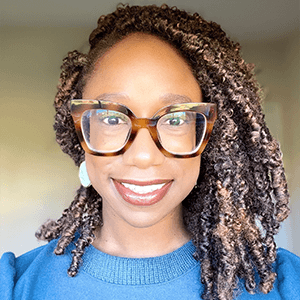In celebration of Black History Month, the American Statistical Association has recognized a group of 12 Black/African American professors, researchers, volunteers, and health care professionals who have made tremendous contributions to the statistics field. We are extremely proud that of the 12 people featured, 4 are members of our Harvard Biostats community.Please see the last interview with alumna Loni Philip Tabb below.
 LONI PHILIP TABB, PhD ’10Affiliation: Associate Professor of Biostatistics, Department of Epidemiology and Biostatistics, Drexel University Dornsife School of Public HealthEducation: BS and MS, Mathematics, Drexel UniversityPhD, Harvard University
LONI PHILIP TABB, PhD ’10Affiliation: Associate Professor of Biostatistics, Department of Epidemiology and Biostatistics, Drexel University Dornsife School of Public HealthEducation: BS and MS, Mathematics, Drexel UniversityPhD, Harvard University
Loni Philip Tabb is from Philadelphia, Pennsylvania, and initially attended Drexel University to earn her BS in business administration. However, during her first co-op in her second year at Drexel, she worked at the Vanguard Group, Inc.—one of the world’s largest investment management companies. This is when she realized her quantitative skills aligned with those majoring in mathematics. From that co-op, Tabb switched majors and successfully earned her BS (2003) and MS (2005) in mathematics.Tabb was introduced to biostatistics during her graduate program at Drexel and was completely in awe of how such a field could exist that blended her love of numbers and storytelling. This added layer of interest led her to apply to several biostatistics PhD programs across the country. She ultimately chose to train at Harvard University within the school of public health.This decision did not come lightly, and, in fact, was a hard decision. Hard because she did not ‘see’ herself at a place like Harvard. However, with the encouragement of her mentor—the late Ewaugh Finney Fields (first African American dean at Drexel University and professor of math)—she applied and was accepted. Tabb successfully completed her training in 2010. Hands down, this was one of her proudest moments.Since her arrival at Drexel University in 2009, Tabb has collaborated on several projects funded by the National Institutes of Health, National Science Foundation, Annie E. Casey Foundation, and Sidney Kimmel Cancer Center—many of which focus on the intersection of health and place and time.Tabb most recently has used spatial statistics and spatial epidemiology methods in researching cardiovascular disease, with a focus on assessing the geography of cardiovascular health in the US between Blacks and whites. She was awarded a K01 Career Development Award (2017) from the National Heart, Lung, and Blood Institute, titled “Assessing the Spatial Heterogeneity in Cardiovascular Risk Factors Within and Between Blacks and Whites.” As the PI of this grant, Tabb has mapped and measured the varying inequities locally in major cities, as well as nationally, with hopes of providing the evidence needed to inform policymakers, health officials, and the affected communities.Tabb has taught biostatistics, survival data analysis, advanced statistical computing, and Bayesian data analysis at Drexel. In addition to her in-classroom instruction, she also mentors significantly, both formally and informally. Her goal with mentoring is to pay it forward and help connect mentees and mentors alike.Tabb is an active member of several biostatistics and public health professional societies, most notably as the current cochair of the Fostering Diversity in Biostatistics Workshop for the Eastern North American Region of the International Biometric Society Annual Spring Meetings. Her leadership in planning this workshop is allowing all students, especially students of color, know they belong—in every room and at every table.



